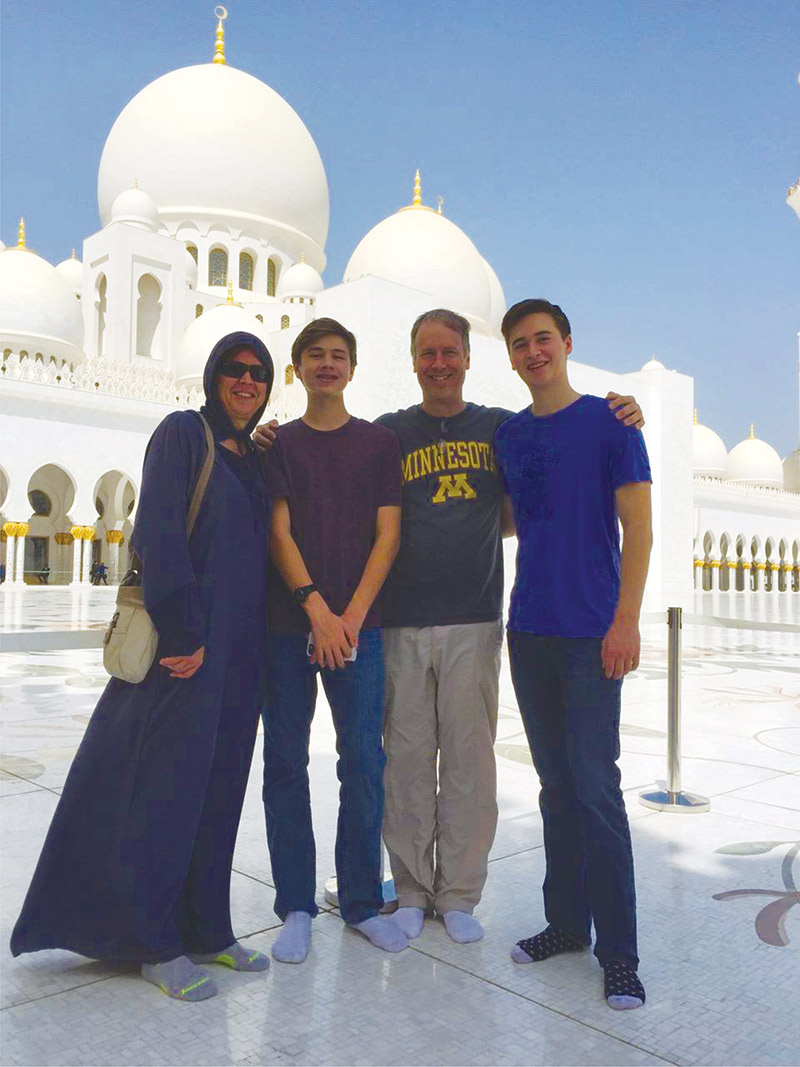
Two Minnesota Band Directors took their passion for music education and their family overseas
Couple Dan Massoth and Kris Hammer lived a relatively normal American life as band directors in the Minneapolis/St Paul area. In 2013 that all changed when they moved to Kuwait City, along with their two boys, where they now teach at the American International School.
Every summer since, the family returns to Minneapolis to visit friends, family, and purchase instruments and band supplies that are hard to find in Eastern Arabia. While in The Twin Cities this summer, Schmitt Music got the opportunity to sit down and talk about their experience.
Why did you decide to take on the teaching positions in Kuwait?
We took the positions in Kuwait to give our kids an international learning experience. At the time that we made the decision our kids were 14 and 10 and we felt that as they got older they would be less interested in leaving their friends in Minnesota
What is the weather like?
So…. Kuwait is hot. But really only during the summer. It can also be surprisingly humid in August and September. This year has been particularly brutal. We had a couple of weeks where every day the dew points were in the 80’s. By October the temps cool down into the 90’s and 80’s and it is really pleasant until May. December and January can be chilly by Kuwait standards (40 in the night and 60 during the day) but that is still shorts weather for us Minnesotans! We have recently had a very rainy November and quite severe flooding. We have had two “rain days” in the past week as we type this.
How about the culture?
It has been interesting seeing people going about their normal lives in traditional dress since there isn’t traditional dress in America. Men wear disdasha and a scarf on their heads. Many women wear Abaya and hijab. Mostly, people just wear normal clothes and for women, maybe a head covering.
And NO – I don’t need to be covered as a woman. And I can drive. And Dan doesn’t need to sign for me to go out of the country. About 35% of the population is Kuwaiti. The rest are expats.
Here is the breakdown: the 2,276,193 foreigners who live in Kuwait come from more than 120 countries from across the world, but Indians form the largest community with 895,348 Kuwaiti Daily Al Shahed reported. Egyptians make up the largest Arab community and are second overall behind the Indians with 586,387 people, followed by Filipinos with 241,268, Bangladeshis with 198,151 and Syrians 145,328, according to The Daily. The Pakistani community is the sixth largest with 109,853 members and the Sri Lankan is seventh with 99,858.
Any notable dietary changes?
Nothing really. The canteen serves pizza, sub sandwiches like in ‘Murica. We do have shawarma (like a wrap with chicken, lamb or beef) and fatayer. Fatayer is a flat bread cooked in a big brick oven. You can get fatayer with spices called zaatar or just full of delicious cheese. We miss Lebanese and Egyptian food when we go home for the summer. It is the first food that we eat when we come back.
What is the school like?
AIS Kuwait is an IB World School. We offer the PYP, MYP and DP programs. The curriculum is typical North American. Learning about the International Baccalaureate was a learning curve for both of us. It is a private school. Students need to be fluent in English to attend. Most of our teachers are North American. There is an Arabic speaking staff that teach the Arabic language and Islamics. Arabic language classes are required for all students regardless of nationality or religion and Islamics is required for all students of Muslim faith. Many students speak 3 or 4 languages. We always have to keep reminding ourselves that we are teaching second language learners.
What are the ensembles you teach? And the sizes of your programs?
Typical North American band program with typical instrumentation. Our school owns all of the instruments and students pay a usage fee. Instruments are not readily available here, although we have forged a relationship with the local Yamaha dealer and they are now providing instruments for students to buy. There is no instrument repair available. Dan does all of the repair. We have an inventory of 350 instruments to maintain.
When we got to the school in 2013, there were 90 students in band grades 7-10. We have now expanded the program to include grade 6 and grades 11 & 12 and there are 300 students in the program.
MS Bands: Grade 6 band – 7 classes of homogenous instruments. 78 students total. Classes meet 3 out of the 8 day teaching cycle.
Grade 7 band – 4 classes of like instrument groupings. 55 students total. Classes meet 6 out of the 8 day teaching cycle.
Grade 8 band – 2 sections of band – typical band instrumentation. 48 students. Classes meet 6 out of the 8 day teaching cycle.
HS Bands: Grade 9 band – 1 section of band – typical band instrumentation. 39 students. Classes meet 6 out of the 8 day teaching cycle.
Grade 10 band – 1 section of band – typical band instrumentation. 37 students. Classes meet 6 out of the 8 day teaching cycle.
Advanced Band (grade 11 and 12) – 1 section 27 students
Do you choose repertoire any differently?
We choose repertoire just like we would in the states. We have had a relationship with the US Army musicians and many embassies that bring over groups to perform.
Honestly, the kids really want to play (and LOVE) the same band pieces I would pick if I taught in Minnesota. There are pieces written with an Arab flavor that we have performed. Again, our program is the same as what you would expect in North America.
Choral music is a different story. Each song has to be approved by the Ministry of Private Education. The songs are sent in 3 months in advance and the lyrics are reviewed to see if they are appropriate for the conservative Muslim culture. Anything that refers to dating, romantic love and some religious topics is banned from performance.
What is the most rewarding part of working at AIS as a music teacher?
We were hired to grow the band program. With support from the administration here with regards to scheduling and funding we have been able to do just that. That has been really rewarding. It is also rewarding to see students be given the opportunity to participate in a band program. We are one of the only schools in Kuwait offering this opportunity on a large scale. We have also had many graduates who are continuing with music in University.
What is the most difficult part?
Repairing instruments, getting supplies (so we order everything from Schmitt Music!!). I would also say that the Arab culture is very social and an oral culture. Student’s social lives take place at school. Being with your family (large extended family) is most important so students don’t spend a lot of time with friends outside of school.
How has it been raising your children in an international setting?
It’s been really great. Both Jake and Cole consider Kuwait “home”. Our oldest son, Jake graduated from AIS Kuwait and is now attending Vrije University in Amsterdam. Attending university out of the country was not even on our radar until we took this opportunity to live abroad. Both of our sons speak and understand basic Arabic. Which is good because we don’t! That has been very helpful on many occasions.
How did your family adjust to living in Kuwait?
It was rough at first. Lots of homesickness and culture shock. I thought Kuwait was so disorganized and it was really hard to deal with government things. Now I am really glad I don’t live in the US. Our kids adjusted much more quickly than we did.
Tell us some basic things about accommodations, shopping for daily needs, etc.
As part of our contract, we receive partially furnished accommodation within walking distance from the school. We own one car, getting a driver’s license was an experience that took way too long. We have supermarkets with many of the same products as you would see in the states. Our grocery stores contain many Indian products as so much of the population is from India.
What do you do for entertainment?
Travel. Here are the places we have gone: United Arab Emirates, Oman, Iran, Qatar, Lebanon, Saudi Arabia, Jordan, Israel (it is called Occupied Palestine here), Egypt, Cyprus, Turkey, Greece, Sri Lanka, Thailand, Vietnam, Singapore, Malaysia, Indonesia, Czech republic, Iceland and most of Europe.
What are your pastimes during the school year?
We both play in quite a few music groups here. There is an orchestra that performs standard classical rep and operas. Dan will play trumpet and Kris will end up playing bassoon parts on baritone saxophone and other ridiculousness like that. There aren’t any bassoon players here!
We put together a rock band with horn section called “3AM Shawarma”. We performed at the US Embassy and also rented a yacht and sold tickets for our performances. Not always the easiest gig when the waves were moving the boat!
There are many big malls in Kuwait. The biggest one is called The Avenues – Think the mall of America on steroids – but we aren’t really mall people.
Kuwait has become better at building more green spaces so there are a couple of really nice parks now to go to when the weather is cooler. There is a new HUGE museum within walking distance of our apartment. There is also a new concert hall that it is fantastic and has many venues.
Going out to eat is very popular here and there is quite a foodie culture. Again, not really our thing, BUT you can have ANYTHING delivered to your door. McDonalds, Cheesecake Factory, Caribou coffee, Dairy Queen, etc. That has been life changing.
What would you tell other teachers about your experience as a teacher in Kuwait?
If you have ever thought about going into International Teaching you should look in to it. What was going to be a 2-year experience for us has now turned in to our career.

Daniel J. Massoth is a presenter of music technology curriculum integration techniques. While working at MakeMusic, Dan guided the business and technical development of the SmartMusic learning software and repertoire. With degrees from the University of Minnesota (B.S., M.A.), Dan has taught in the Wayzata, Mahtomedi, and Osseo, Minnesota, school districts and currently teaches instrumental music and serves as Head of Arts at the American International School in Kuwait. He has also served on the executive board of the Minnesota Band Directors Association and as technology chair for the Minnesota Music Educators Association.
Kris Hammer started her music education career in Mahtomedi public schools and then taught elementary band in the Eden Prairie Schools from 1993 – 2013. She holds a B.S. in Music Education from the University of Minnesota and a M.Ed in Teacher Leadership from the University of Minnesota. She played co-principal clarinet with the Wayzata Symphony Orchestra and many other local groups.

The point of view of your article has taught me a lot, and I already know how to improve the paper on gate.oi, thank you. https://www.gate.io/signup/XwNAU